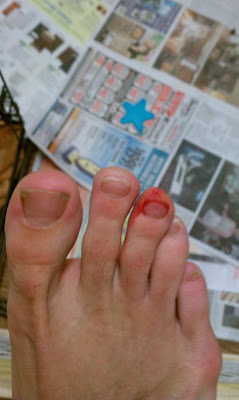I started thinking about this mainly because I was DYING on the run today and was trying to distract myself from the pain in my feet, but the past few workouts at race pace were pretty easy. I'm guessing the tough run today was attributed to poor hydration yesterday... bad Mark!
 |
| Post run... very facebooky. At least my shirts on, though. |
 |
| Pssh whatever. I didn't even cry. Cuz I'm super tough, ya know?! |
Okay, so now that I got you interested in figuring out YOUR pace, let's get into some brief explanations on how you can do it.
To find out your race pace, for any race, the best thing to do first would be race in a 5K! This will give you a good mile time comparison, with you running at your best. Plus, the extra adrenaline from the race day excitement should help your times. To break down your 5K results into mile times is really easy! Take the total time of your run (TT), and divide by the distance in miles you ran (3.1 miles for a 5K), and you get your average mile time! Or just check your race printout, if you got one.
What if you are training for a 5K? One easier/shorter way that happens to be less expensive would be a 2 mile time trial on a track. Even though you would be running a shorter distance, this will probably be slightly slower than your 5K time because you aren't running with adrenaline or a bunch of people. But it is still effective. Your 2 mile time trial time and your 5K time should be pretty close! To do, warm up for 15 minutes at a track, then run for 2 miles (8 laps) as fast as you possibly can. Again, divide your time by 2 (for the miles) and you have your average mile time. If all else fails, run 1 mile as fast as you can, and boom! You have your 1 mile pace.
Now that you have your mile time, you can "guess" what your times would be for longer distances. Since I am training for a 13.1 race, that's what I have usually been looking at. You can find this information in a number of places. All you have to do is Google search "race pace calculator" and you will get a whole slew of them! On a personal note, I have tried using the one from Runner's World Magazine, and think the times are a little tough for longer races. It has my 5k time and 10k time exactly the same time per mile. Yeah Runner's World, that's not happening...
The one I use is the McMillian Running Calculator. I like this one better because the times aren't conservative, but also possible. It also gives you a better printout of different paces per race distance, suggested paces for different workouts (recovery, tempo, long runs, easy runs), and suggested paces for interval and speed workouts. Basically, it takes the guesswork out of your pacing! I highly suggest the site!
I plan on re-evaluating my race pace soon. Honestly, I have been using a 5K time from one of my triathlons, so I'm guessing my pace should be a little faster. I have heard from other runners that you should continually re-evaluate your mile times every 4-6 weeks, because it fluctuates as your fitness changes. I'm excited to see if my pace has changed now that I am running much more than previously! I will let you know which way it goes!
This may be some pretty basic information for the "seasoned veterans", but I learned about it this year, so it is still new to me. I always thought people just went out and ran, just doing what they could and pushing themselves for a good total time. Today, I now see the strategy and planning involved in not only the races, but also the hours of training that goes in. Pretty awesome.
No comments:
Post a Comment